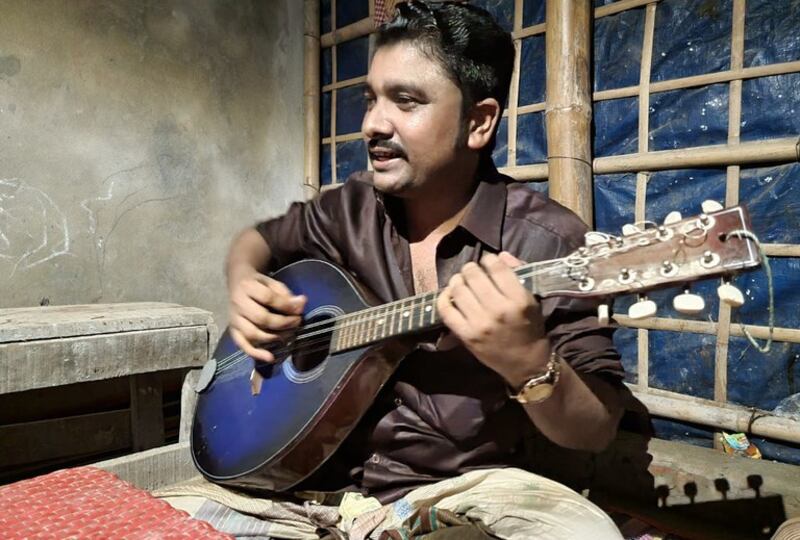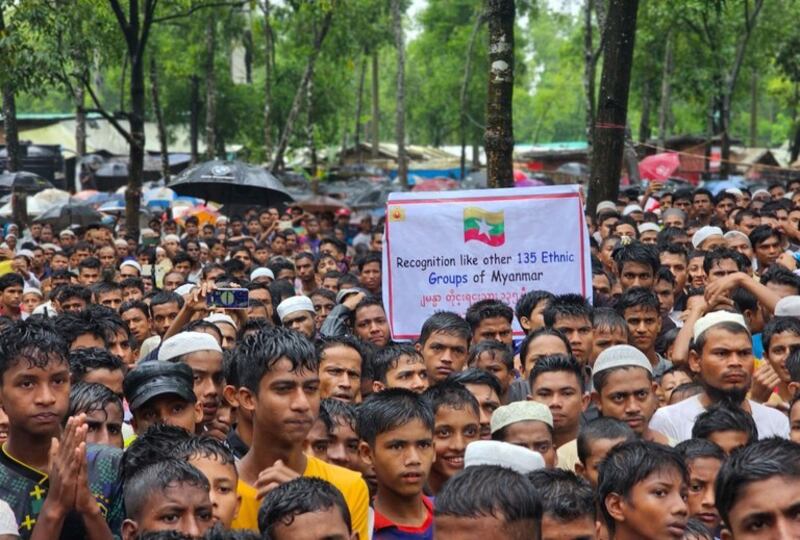As the years pile up for Rohingya living in sprawling camps in Bangladesh, with no repatriation in sight, a traditional genre of ballad that serves as a means of easing pent-up emotions is being turned into an instrument of protest.
Rohingya have long sung “Tarana Geet,” a type of lyrical poem, as a musical lament conveying themes of personal and religious tragedies. But in recent years, the ballads have become a must-have feature in Rohingya protest rallies at refugee camps in Cox’s Bazar. The songs often evoke tears.
“Tarana reminds the Rohingyas that they too have a country from which they were exiled,” said Mohammad Alam, a Rohingya leader who chairs a committee in one of the camps in Cox’s Bazar. “Tarana songs tell of a history of ongoing torture on us.”
Cox’s Bazar, a southeastern district of Bangladesh, hosts about 1 million of the refugees in camps that sprawl near the border with Myanmar. These include 740,000 Rohingya who fled across the frontier following a brutal 2017 military crackdown in Rakhine, their home state.
Recent Taranas, usually sung by a single vocalist with one or two simple instruments such as a mandolin or harmonium, capture a yearning for a lost home and the stresses of camp life. Recitations of popular songs such as “Let’s all go back to Arakan,” referring to the historical name of Rakhine state, draw strong emotions in protest rallies.
“The Rohingya have an old love for Tarana songs composed with simple words in traditional tunes. We can readily grasp the mood they convey,” said Nur Ahmad, an activist with the Arakan Rohingya Society for Peace and Human Rights. “That’s why it’s becoming our protest language now.”
On Aug. 25, 2017, Rohingya started to flee ethnic cleansing and widespread violence in Rakhine when the Burmese military launched an offensive in response to a Rohingya militant attack on border-police outposts.In March 2022, the United States declared the events a genocide.
In the six years since, attempts to repatriate the refugees from Bangladesh have failed as international concerns about their protection and rights persist in Myanmar, which is ruled today by a military government, which seized power in a February 2021 coup.

Sirajul Islam, a Rohingya musician for 24 years, makes a living by singing Taranas. Based on a well-established tune, he recently improvised a new Tarana lyric titled “Rohingya Tragedy.” based on a well-established tune.
He agreed to sing it at a gathering in the Leda refugee camp last year for BenarNews correspondents: “Oh brother, oh brother, listen carefully. Listen to Arakan’s story, oh brother.”
“Someone has lost their husband. Someone has lost a descendant. Oppressed by Moghs and Burmese, our Rohingya mothers and sisters. How destitute have they made us.”
He went on to describe the pain of camp life: “Come to the refugee camp. See how the situation is, brother. We live packed together, oh brother.”
One of his songs, named “Rohingyas have no peace,” is among the most popular Taranas among the refugee community: “We are now stuck overseas, oh brother. No country has Arakan-like peace. When I recall Arakan, tears fill my eyes.”
“Our desire cries out for Arakan, but we have no way to return.”
Recent upheavals in Rohingya camps inspired Islam and others to compose Taranas with more political themes. Many are crafted as a tribute to Muhib Ullah, a prominent Rohingya leader who was shot and killed two years ago.
Ahmed Hossain, a 42-year-old refugee musician, sings in one of his songs, “Everyone is here. Only Master Muhib Ullah isn’t. Why is my heart burning, for Master Muhib Ullah Bhai.”
Preserving ‘Tarana’
Tarana’s popularity has ignited a race to preserve these ballads.
In the refugee camps, the Rohingya Cultural Memory Center (RCMC), run by the International Organization for Migration, preserves arts, artifacts, cultural treasures and heritage, including about 100 Rohingya songs of different varieties.
RCMC also hosts performances by Rohingya artists, including Ahmed Hossain, and features traditional Rohingya musical instruments at its exhibition center in a camp in Ukhia, a sub-district of Cox’s Bazar.
The RCMC didn’t respond to a request for comment, but Asif Munier, a cultural activist in Bangladesh formerly employed by the IOM, told BenarNews that “earlier, the Rohingya tried to attract the international community by displaying signs in English during protests” in the camp area.
“It’s interesting that their protest is now going to a different approach. The Rohingya protest is now developing its own identity,” he said.

Mayyu Khan, a young Rohingya artist and researcher, said he appreciated RCMC’s work, but believed more needed to be done.
His individual collection has more than 100 songs gathered since 2017. But he doesn’t know about the original creators of most lyrics and songs. “I only recorded most of the soundtrack on my phone and also gathered rare songs from other people’s devices.”
He uploads the songs on his social media pages, but aspires to build a more robust archive of the musical treasures.
Meanwhile, a record company in Australia, dedicated to capturing lives in exile, has recorded some of the Tarana music, sourcing songs and lyrics from traditional folklore and refugee artists.
On its website, Music in Exile said only a few high-quality recordings of Rohingya traditional music exist and notes that little has been written about the music in English.
“Few musical recordings have been made in Rohingya villages or refugee camps,” the NGO wrote after a trip to the area. “Despite increasing media attention on the crisis, most reports focus solely on the atrocities refugees have faced and not on their culture and memory – an essential part of their story gets left behind.”
BenarNews is an RFA-affiliated online news organization.
